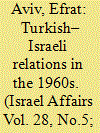| Srl | Item |
| 1 |
ID:
177741


|
|
|
|
|
| Summary/Abstract |
In order to pressure Israel to withdraw from the lands it took following the 1956 Suez War, the United States made two key commitments. It promised Israel it would open the Straits of Tiran if Egypt reimposed a blockade and that if the blockade nevertheless persisted, Israel would have the right to act on its own to ensure free passage of Israeli ships. When Nasser closed the Straits in 1967, President Johnson reneged on both commitments. LBJ chose not to act to end the blockade and warned Israel not to act alone. The failure to live up to these commitments contributed to the outbreak of the 1967 War, hampered efforts to get Israel to give up the territories it conquered as a result of the war, and reinforced in Israel the conviction that it could not depend on others for its security. Israel and the Middle East would be very different places today if those commitments had been fulfilled.
|
|
|
|
|
|
|
|
|
|
|
|
|
|
|
|
| 2 |
ID:
154057


|
|
|
|
|
| Summary/Abstract |
This article discusses the causes and processes that drove Menachem Begin and his Gahal party into the Israeli cabinet during the three-week waiting period preceding the June 1967 war (or Six Day War as it is commonly known). A close examination of Begin’s behaviour reveals a calculated political move aimed at exploiting deep processes within the Israeli political establishment in general, and its right-wing factions in particular. This sheds fresh light on a number of key events preceding the war, notably Prime Minister Levi Eshkol’s surrender of the defence portfolio to Moshe Dayan, as well as on the deeper processes that led within a decade to the Likud’s (Gahal’s successor) rise to power, for the first time in Israel’s history.
|
|
|
|
|
|
|
|
|
|
|
|
|
|
|
|
| 3 |
ID:
161384


|
|
|
|
|
| Summary/Abstract |
This article examines the short- and long-term effects of the 1967 Six Day War on the Israeli economy. In the short run, the war led to a very big increase in aggregate demand (mainly military expenditures). This got the economy out of a Keynesian recession that prevailed before the war. There were several long-term effects. The French embargo on arms shipments to Israel, following the war, induced the development of a large military industrial base, which later became the basis for the impressive development of the high-tech industry. The influx of Palestinian workers into Israel depressed wages of unskilled workers, which slowed down the shift to more efficient production techniques (especially in construction). It also increased the dependency of the Palestinian economy on income earned by Palestinian workers in Israel.
|
|
|
|
|
|
|
|
|
|
|
|
|
|
|
|
| 4 |
ID:
187061


|
|
|
|
|
| Summary/Abstract |
Based on hitherto untapped documents from the Israeli and Turkish state archives, this article discusses Turkish–Israeli relations during the 1960s. It shows that since the relationship was more important for Israel, Ankara called most of the shots while Israel used its relative advantages, especially in the economic and trade fields, to keep the relations going. Hence, despite intensifying political and economic ties with the Arab world since the mid-1960s, Ankara resisted persistent pressures to downscale, if not end altogether, its relations with Israel, though these took the odd beating in line with the vicissitudes in Turkey’s domestic and international affairs.
|
|
|
|
|
|
|
|
|
|
|
|
|
|
|
|